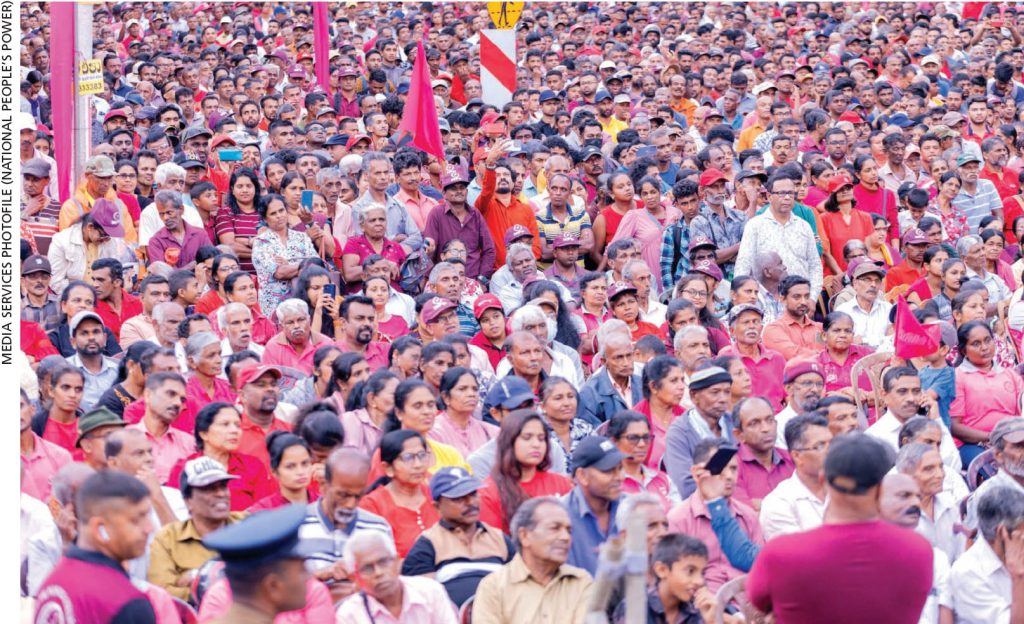SRI LANKA TODAY
The arrest of former president Ranil Wickremesinghe saw the opposition coming together to discuss how to respond to the challenges posed by the government. However, their difficulty is that they were decisively rejected by the electorate at the last presidential and general elections.
Before the twin elections, the aragalaya protesters had demanded an end to corruption and impunity, and called for a new leadership free of dynastic privilege. This call was not for the return of old faces but rather, for political renewal and accountability.
THE POWER OF DEVOLUTION
Provincial councils will empower the electorate – Dr. Jehan Perera

The most salient feature of the new government is its self-contained style of decision-making. It has been reported that decisions are made after internal discussion and debate.
But there isn’t a similar dialogue being conducted with the opposition or civil society, possibly because government leaders believe they have a clear mandate to implement their policies and therefore, see no need to dilute that mandate.
With its overwhelming majority, the government has no parliamentary need to include rivals. Public opinion polls show that trust in the opposition continues to remain low and this reinforces the government’s reluctance to work with them.
At the same time, the government has embarked on a sustained anticorruption drive with politicians and administrators from past governments frequently being questioned by the Commission to Investigate Allegations of Bribery or Corruption (CIABOC), investigated by the Attorney General’s Department or arrested by the police.
Even within its own ranks, ministers haven’t been exempted from scrutiny, suggesting that this pursuit of accountability isn’t only for political show. The visible determination to address corruption has deepened public perceptions that the old political order is discredited – and that the opposition belongs to that past.
Inducement for the opposition to regroup comes from these realities. They can’t halt the government’s anticorruption programme, for this was precisely the mandate given by the voters.
What opposition forces fear is prolonged irrelevance. Unless they find a structured way of regaining legitimacy and re-engaging with the electorate, they risk isolation.
It’s in this context that the idea of sub-national power sharing, as a possible pathway back into political life, has begun to receive attention.
The opposition’s frustration at being marginalised at the centre could be mitigated by gaining influence at the sub-national level. They can demand that the long postponed provincial council elections be held without delay.
This system was originally established to share power with ethnic and religious minorities, particularly in the Northern and Eastern Provinces.
But it also provides a mechanism to share power with opposition parties across the nine provinces. Since the National People’s Power (NPP) dominates the legislature, the opposition is unlikely to challenge it at the centre before the next general election.
However, at provincial level they still retain organisational bases and personalities capable of mobilising votes.
The government has promised to hold provincial council elections in the first half of next year. In the past, mainstream parties hadn’t championed the provincial council system, seeing it mainly as a minority demand.
Nevertheless, under the present circumstances, the opposition could make provincial councils central to their political strategy. This would require reform. At present, centrally appointed governors possess the power to block or indefinitely delay decisions of elected councils. This has reduced the councils to mere shells of authority.
Reform should restrict the governors’ powers to matters of serious national concern such as a breakdown of law and order, and subject them to judicial review. Only then will provincial governance become meaningful.
This line of thinking opens a wider horizon: democracy requires both an effective government and an effective opposition. Without an opposition that can exercise power somewhere within the system, politics risks sliding into one-party dominance.
By accepting provincial councils, the opposition can show that power sharing is not only a demand of ethnic minorities but also a mechanism that strengthens democracy.
And the government too will benefit. Far from weakening its mandate, devolution will widen democratic participation and create avenues for consensus in a divided society.
Reforms to the provincial system will serve not only the opposition’s survival but also the national reconciliation process. Devolution is essential to bridging ethnic divides and if mainstream parties adopt it as a route back into politics, self-interest and national interest will converge.





